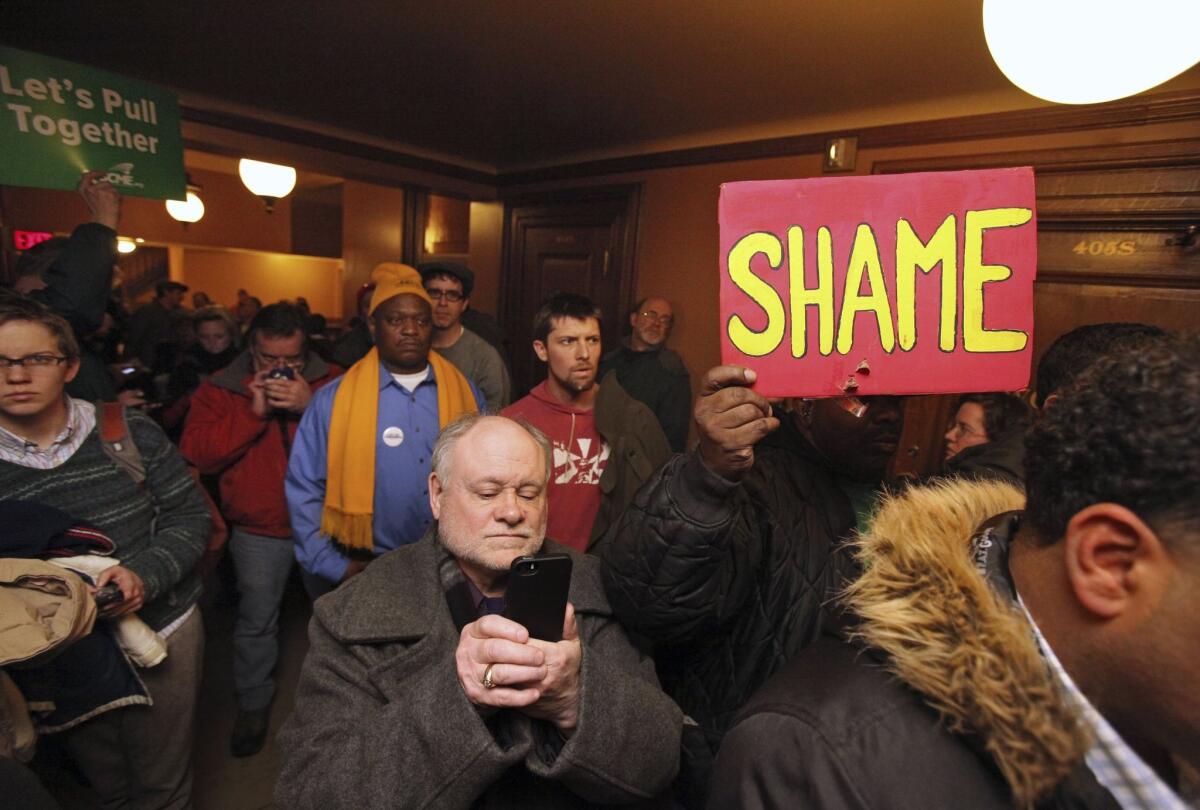Scott Walker, GOP presidential hopeful, is poised to sign Wisconsin’s right-to-work law

- Share via
Sometime in the next few weeks, Wisconsin will likely become the 25th state to get a right-to-work law, opposed by organized labor because it eliminates the requirement that workers must pay union fees.
For Gov. Scott Walker, who ignited a spate of anti-union activity in recent years and has risen to become a national figure in the Republican Party, the new law is part of a platform that some see as strong enough to carry him to the presidential nomination.
Late Wednesday, the state Senate passed the right-to-work measure on a mostly party-line vote of 17 to 15. It now goes to the GOP-controlled Assembly, where it is expected to be passed next week, then on to the desk of Walker, who has said he will sign it.
The signing would complete an agenda for Walker that began in 2011 when he pushed for passage of Act 10, which stripped collective bargaining rights from most public workers. Both the 2011 law and the latest one sparked vehement, but fruitless, demonstrations by labor groups at the state Capitol in Madison.
First elected governor in 2010, Walker won a labor-inspired recall election in 2012 and then came back and won reelection to his second term in 2014. In campaign appearances as he builds toward seeking the GOP presidential nomination, Walker has made a point of noting that he had to run three elections in four years and blames the Democrats and their labor allies for the campaign marathon.
A right-to-work law breaks what unions consider to be a key contractual demand, that any worker in a unionized shop should be a member or pay a fee to the union for services including bargaining for better wages and work conditions. The union argument is that all workers get the benefits from a contract so all should pay, even if they don’t want to.
For conservatives, the argument becomes that no one should be forced to join a union. Arkansas became the first right-to-work state in 1944, quickly followed over the next few years by Florida, Arizona, Nebraska, Virginia, Tennessee, North Carolina and Georgia.
The modern right-to-work movement has a distinctly Midwest flavor, beginning with Wisconsin’s move against public employee unions, which led to Indiana passing legislation in 2012, Michigan approving a referendum in 2013 and now back to Wisconsin in 2015, Patrick Semmens, a spokesman for the National Right To Work Committee, told the Los Angeles Times.
“Suddenly we have legislatures saying they want to be economically competitive and bring jobs back to the states, but there is also obviously a political component,” Semmens said.
“The labor unions wanted to remove Walker from office and spent a ton of money to stop him from getting reelected, but he kept on succeeding. Politicians may like to do the right thing, but they like to be reelected,” he said.
“Walker has certainly become a national political figure off of this issue, so I see him continuing because I don’t see a down side for him,” Semmens said. “If you look at the early states, they are almost all right-to-work states: Iowa, Florida, South Carolina.”
Semmens also argued that national polls show Americans strongly supporting right-to-work laws.
Kent Wong, director of the UCLA Labor Center, a research and education facility at the university, said he agreed that Walker has risen to prominence because of his stand on labor issues and the gutting of unions.
“The right-to-work movement has the intent of decreasing union power,” Wong told The Times. “The latest campaign has given conservative governors and state legislatures an opportunity to undermine union membership.”
Union membership is at a 50-year low, running about 12% of the total workforce and just 7% of those working in the private sector, Wong said. The decline in membership was caused by a drop in jobs, particularly in the once-highly unionized Midwest and the growth of jobs in non-unionized economic sectors such as the service industry.
Walker has been going through a political upsurge in recent weeks, though such early boomlets are notoriously fragile. Still, a Quinnipiac University poll released Tuesday found that Walker held a significant lead in Iowa at around 25% of GOP voters. The next closest Republican was U.S. Sen. Rand Paul of Kentucky, who was backed by around 13%.
Wisconsin, with its 10 electoral college votes, has a split political history. Republicans control both houses of the legislature, the governor’s office and one of two U.S. Senate seats. The other Senate seat is held by a Democrat.
On the presidential level, Democrats have won the seven elections since 1988, although the 2000 and 2004 races were extremely close. Barack Obama won by 56% to 42% over John McCain in 2008 and Obama defeated Mitt Romney 53% to 46% in 2012.
Follow @latimesmuskal for national news.
More to Read
Sign up for Essential California
The most important California stories and recommendations in your inbox every morning.
You may occasionally receive promotional content from the Los Angeles Times.














